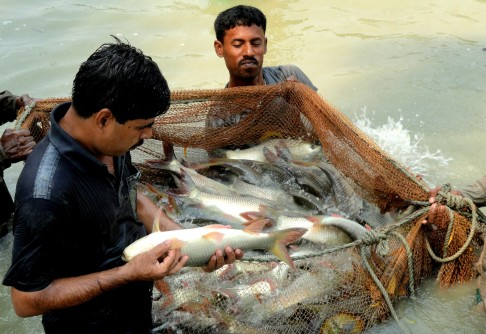
$5M grant supports aquaculture projects to solve world hunger
June 17, 2020
By
Mari-Len De Guzman
 Researchers and producers in Bangladesh test the sexual maturation of Riverine rohu, a major Indian carp species, for a study in which researchers at the MSU-based Fish Innovation Lab are sequencing the fish’s genome to help improve broodstock. (Photo: Gulam Hussain)
Researchers and producers in Bangladesh test the sexual maturation of Riverine rohu, a major Indian carp species, for a study in which researchers at the MSU-based Fish Innovation Lab are sequencing the fish’s genome to help improve broodstock. (Photo: Gulam Hussain) Mississippi State University (MSU) has allocated $5.7 million in grants to develop innovative approaches to help solve global hunger, an issue that affects more than 800 million people worldwide.
The grant is administered through university’s Feed the Future Innovation Lab for Fish. As part of the U.S. Government’s Feed the Future program and funded by the U.S. Agency for International Development, the Fish Innovation Lab works to reduce poverty and improve nutrition, food security and livelihoods in developing countries by supporting research on sustainable aquaculture and fisheries systems.
“Rich in protein and nutrients, fish are among the most traded agricultural commodities in the world. Improving how fish are produced, caught, prepared, distributed and sold can enhance nutrition and livelihoods among small-scale producers and low-income households in many developing countries,” said Mark Lawrence, director of the Fish Innovation Lab and professor in MSU’s College of Veterinary Medicine.
The $5.7 million grant fund will support 12 research-for-development projects focused on aquaculture and fisheries activities along the fish value chain in Bangladesh (3), Cambodia (2), Kenya (1), Nigeria (5) and Zambia (1).
Addressing challenges unique to each location, project teams will be working to increase fish production, mitigate risk of disease and fish loss, and improve human outcomes in targeted regions of the developing countries with high need.
“All projects will also incorporate the Fish Innovation Lab’s cross-cutting themes: human capacity development, gender equity and youth inclusion, nutrition and resilience,” a statement from the MSU said.
The projects were selected through a competitive process that garnered 247 proposals. Each project is led by principal investigators from the U.S. and the host country, and supported by a team of researchers at U.S. and host country institutions, fostering shared learning and collaborative strategies throughout the lab, the statement added.
“The Fish Innovation Lab is a platform for innovation, connecting a consortium of public and private organizations, government agencies, universities and aquaculture associations to address promising advances and emerging challenges in aquaculture and fisheries,” Lawrence said.
Mississippi State is the lead research institution for two of the projects in addition to overseeing and supporting the full research portfolio as the management entity of the Fish Innovation Lab.
Mississippi State is a top-ranking university for agriculture and natural resources research and development, generating more than $100 million in expenditures annually. It is recognized as a Center for Knowledge for Aquatic Health by the United Nations’ Food and Agriculture Organization. MSU’s Global Center for Aquatic Food Security addresses challenges facing aquaculture and finds solutions to meeting the world’s food security needs while ensuring a safe supply of fish.
Advertisement
- Ocean Wise partners with Kuterra in seafood program
- Study proves viability of farming various shellfish species together





